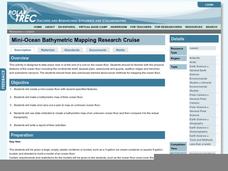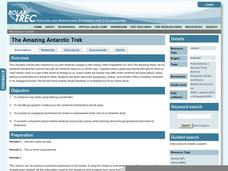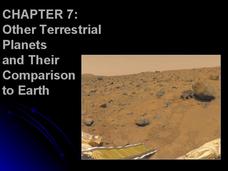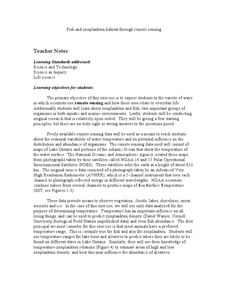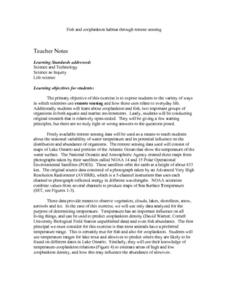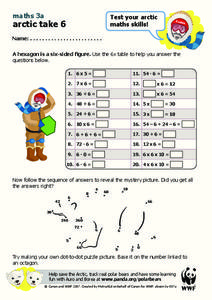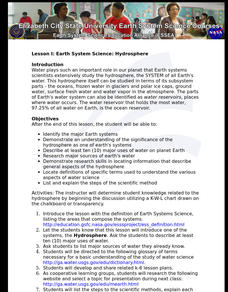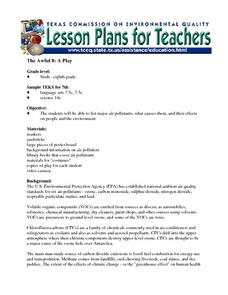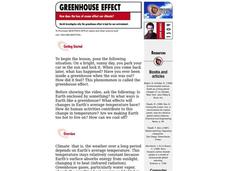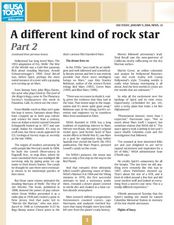American Museum of Natural History
Climate Change
It actually is possible to have too much of a good thing when it comes to climate change. A slide show lesson describes how burning fossil fuels contributes to climate change. Individuals read about the scientific process and the...
Polar Trec
Mini-Ocean Bathymetric Mapping Research Cruise
Middle or high schoolers transform into oceanographers in a week-long simulation. To begin, each group follows directions to create a model of the ocean floor with specified features. Next, the groups prepare to set sail on a research...
Polar Trec
The Amazing Antarctic Trek
This resource provides two ways to engage learners in using latitude, longitude, and research skills. In pairs, or on their own, learners will locate several Antarctic regions on a map. They will write the name of the place and a few key...
Curated OER
Plankton Parade
Plankton isn't just a tiny cartoon character, it's also a very important food source for animals around the world. Budding scientists discuss the types and functions of plankton, including where they are found, how they are caught, and...
Glynn County School System
Terrestrial Planets
Mercury, Venus, Earth, and Mars are collectively known as the terrestrial planets. Although part of the same group, each planet has its own set of characteristics. Scholars explore the characteristics that make the planets unique and...
American Museum of Natural History
Ask a Scientist About Our Environment
Scientists respond to 26 question posed by learners. These experts answer in easy to understand language, include photos to illustrate the issue, offer suggestions for how young people can make a difference, and supply links to resources...
American Museum of Natural History
Ask a Scientist About Our Environment
Let's ask an expert! Scientists at the American Museum of Natural History field questions about the environment in an interactive resource. Question topics range from global warming and conservation to endangered species and habitats.
Curated OER
Fish and Zooplankton Through Remote Sensing
Ecology aces examine sea surface temperature maps and relate temperatures to concentration in fish and zooplankton populations. Take your class to a computer lab and provide experience with actual remote sensing data. Some of the links...
Curated OER
Fish and zooplankton habitat through remote sensing
Students are exposed to the variety of ways in which scientist use remote sensing and it used in everyday life. They investigate about zooplankton and fish. Students list the two important groups of organisms in both aquatic and marine...
World Wildlife Fund
Arctic Shapes
In a two-part worksheet, young geometers examine 3-D shapes and describe their attributes in a table. They will be able to draw the shape and name the number of vertices, faces, and edges. In the second part, individuals explore nets of...
World Wildlife Fund
Arctic Take 6
The magic number is six! Using a 6x table, young math stars practice adding, subtracting, multiplying, and dividing two-digit numbers with the number six. This worksheet also touches on making tessellations with hexagons.
NOAA
Ocean Zones
How can organisms light up in water? Bioluminescence is light produced in a chemical reaction that can occur in an organism's body. First, learners determine what happens to light/color as you move into the deep ocean. In groups, they...
Messenger Education
Give Me a Boost—How Gravity Assists Aid Space Exploration
The propellant needed for space explorations runs in the thousands, while paying to get the craft into orbit costs millions! In the second installment of three, two activities explore laws of conservation of energy and momentum. Using...
Glynn County School System
The Outer Planets
Are outer planets just like inner planets? Nope! The outer planets are much more spread apart than the inner planets. An informative PowerPoint presentation shows why this is true as well as facts about the individual planets in the...
Curated OER
How Islands Form
Students how islands form, rising water levels, growth of coral, and volcanoes. They complete Island Investigation worksheets after researching island formation on various Internet websites.
Curated OER
Wanted: Water!
Learners determine what percentage of the Earth is water and how much water is needed by humans.
Curated OER
Water Pressure - Disparity of Resources
Young scholars examine the disparity of resources between developing and industrialized nations, and research the problem of water availability as world populations increase and natural resources are stressed.
Curated OER
Earth System Science: Hydrosphere
Students identify the major Earth systems, and describe at least ten major uses of water on planet earth. They research major sources of earth's water, and describe general aspects of the hydrosphere.
Curated OER
The Awful 8: A Play
Young scholars perform a play that presents the causes and effects on people and the environment of the eight major air pollutants.
Curated OER
Testing Water Quality
In this science activity, learners test the quality of water taken from a local source and test it in a lab for the ingredients present.
Curated OER
Probability Lines
In this math worksheet, middle schoolers make estimates to consider the possibility of each event taking place from impossible to likely.
Curated OER
The Inner Planets
In this planets worksheet, students review the characteristics of the inner planets: Mars, Venus, Earth, and Mercury. This worksheet has 15 multiple choice questions.
Curated OER
Greenhouse Effect
Students investigate the greenhouse effect. In this environmental lesson, students investigate why the greenhouse effect changes the climate through an experiment. Students use vinegar to simulate how acid damages the environment.
Curated OER
A Different Kind of Rock Star: Part 2
Students examine our society's fascination with Mars. For this journalism lesson students read an article that outlines the various ways Mars has captured our imagination and are given topics for discussion and a chart to complete.



